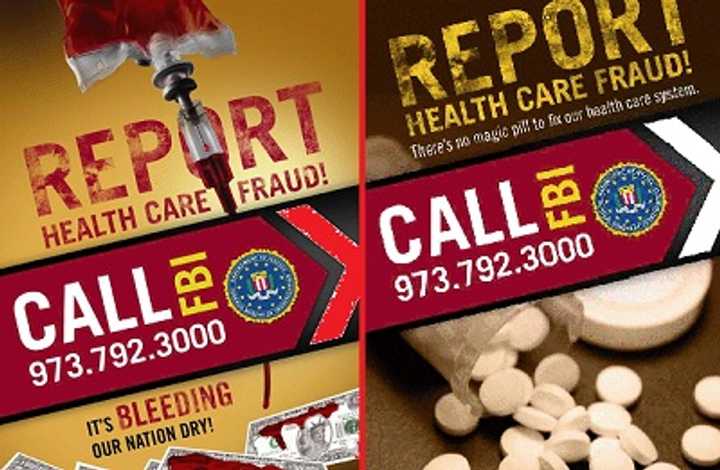The messages, which began running Monday, are on digital billboards on Routes 80, 95, 78, 287, and 280, as well as at 40 kiosks at 13 malls throughout the state.
The pilot program will run through Sept. 25. If successful, it’ll go national.
Each message speaks to a different audience: One features a mother cradling an infant, while one aimed at health-care professionals features a surgeon with a scalpel. Another speaks to seniors: “There’s no magic pill to fix our health care system. Report health care fraud!”
Money talks, too: One ad has an intravenous bag filled with blood dripping onto a pile of cash. The message: Health-care fraud is “bleeding our nation dry!”
“This is the first time the FBI has used advertisements to further a general investigative priority,” said Michael B. Ward, the Newark Field Office’s Special Agent in Charge. The purpose, he said, is to educate the public about health care fraud, show how it affects our individual tax bills and is “not some nebulous government problem” and to get high-quality tips that can help federal agents nail the cheats.
“By coming to law enforcement with information about criminal activity, the public becomes a force multiplier,” Ward said. “It’s almost as good as having an agent right there in the midst of the criminal activity. That alone will put criminals on alert and hopefully discourage the rampant theft from these programs.”
The number: (973) 792-3000
As people live longer, health-care costs are expected to increase – currently more than twice the rate of inflation – with government funding covering $1 trillion. At the same time, tips have been decreasing.
The HCF unit in Newark got only 18 complaints from the public last year, down from 25 in 2008. Even worse, referrals from other law enforcement agencies plummeted to nine, from 66 two years earlier.
The bureau works closely with the U.S. Department of Health and Human Services, the Centers for Medicare and Medicaid Services and state and local law enforcement agencies to root out health fraud, abuse and public safety threats. Its Health Care Fraud unit even receives its own federal funding separate from the bureau.
“Medicare and Medicaid represent the largest publicly funded programs and are, therefore, targeted frequently,” Ward said.
The 3% to 10% percent of total losses “are more substantial than losses in any other sector of the public or private marketplace,” he said, citing daily health-care fraud costs of a minimum of $164 million a year. In fact, last year’s losses in New Jersey alone were around $7.5 million, the ninth-highest nationwide, behind California, New York, Texas, Florida, Pennsylvania, Illinois, Ohio, and Michigan.
The bureau’s active caseload has passed the 2,600 mark, leading to 750 convictions of 1,000 people charged, the FBI said in a statement. Although the numbers seem high, “this is only scratching the surface,” Ward said.
The numbers have dropped so dramatically, he said, because fewer people are coming forward – be it to local, state or federal authorities. The FBI are banking on the new campaign – aimed at making the public more aware of health-care fraud and telling citizens how and where to report it – will make a huge difference.
“Post 9/11, the FBI transformed itself from the traditional police organization into an intelligence-driven machine,” Ward said. “Every step of every investigation is based on information from many different types of sources and interagency cooperation and it is all checked and rechecked.
“To make a good case – any case –you need human source reporting.”
For more information: CLICK HERE
Click here to follow Daily Voice Rutherford and receive free news updates.
